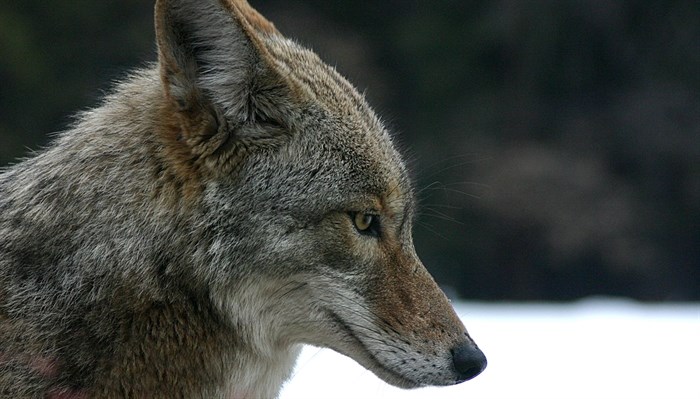
Image Credit: Wikimedia Commons
January 17, 2019 - 4:37 PM
OKANAGAN - Coyotes will be feeling extra frisky over the next two months and while it can be a romantic time for them, pet owners are advised to use additional caution around these animals.
Coyote mating season begins in early February and ends in mid-March according to Vanessa Isnardy, WildSafeBC's provincial coordinator. During this one-month period, coyotes, which tend to be monogamous creatures, start the great cycle of life by finding a mate and procreating. Life can be hard for these bachelor coyotes, as they're known to become particularly territorial and aggressive at this time, which can pose problems for people, particularly pet owners.
Isnardy said because bears hiberate in the winter, pet owners sometimes drop their guard and let their pets off leash in the woods during the cold months. Popular pets like dogs and cats are easy pickings for coyotes, especially when the animals are off-leash and alone.
"Coyotes perceive dogs as potential threats or meals," Isnardy said. "Keep your cats inside at night."
Isnardy also recommends leaving bird feeders out of reach during mating season. She said coyotes are usually active at dawn and dusk, making those times the highest risk periods for pets.
Isnardy said coyotes will rarely bother with people unless they view them as a food source. Isnardy warns against feeding coyotes, stating that coyote-human incidents typically stem from giving the wild animals food.
While coyotes are aggressive during mating season, Isnardy said there are several tricks to warding them off in the woods. She advises making yourself look big and standing your ground. Whatever you do, don't run, since that triggers the predatorial instinct in coyotes. She also suggests people carry bear spray. She also noted that while coyotes can be aggressive during mating season, they tend to shy away from people.
Isnardy said after mating season cubs are born around May and June. She noted that coyotes can be even more aggressive and territorial during the early days of their offsprings' lives, as incidents of attacks on livestock and pets tend to spike in this period. According to a dataset from WildSafeBC, in 2018 the Conservation Officer Service received 1218 calls regarding coyotes, with the biggest months being November, December, June, October, and May.
Isnardy advises anyone who sees a particularly aggressive coyote in the woods to call the Conservation Officer Service, as the creature may be guarding a den and the information can help the organization draw a more complete picture of the area. The Conservation number is 1-877-952-7277.
Despite coyote mating season, Isnardy doesn't want people to be afraid of exploring the B.C. wilderness, but if they do they should take precautions.
"We never discourage people from going into the woods," she said.
— This story was updated at 11:49 a.m. Monday Jan. 21 to include additonal comments from Isnardy about coyote behaviour. The original article also incorrectly referred to bird feeders as cages and listed WildSafeBC as a contact for aggressive coyotes reports.
To contact a reporter for this story, email Sean Mott or call (250) 864-7494 or email the editor. You can also submit photos, videos or news tips to the newsroom and be entered to win a monthly prize draw.
We welcome your comments and opinions on our stories but play nice. We won't censor or delete comments unless they contain off-topic statements or links, unnecessary vulgarity, false facts, spam or obviously fake profiles. If you have any concerns about what you see in comments, email the editor in the link above.
News from © iNFOnews, 2019